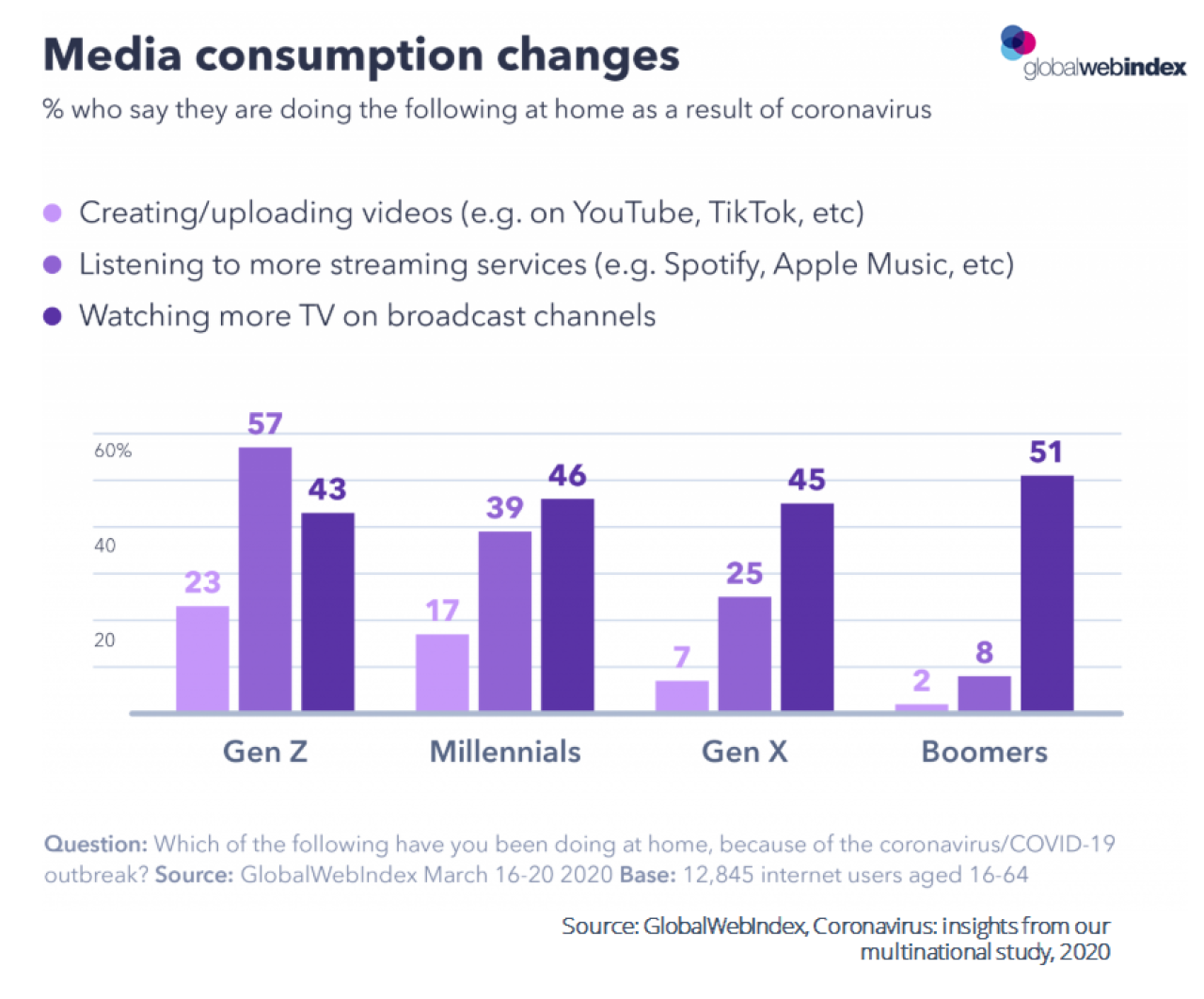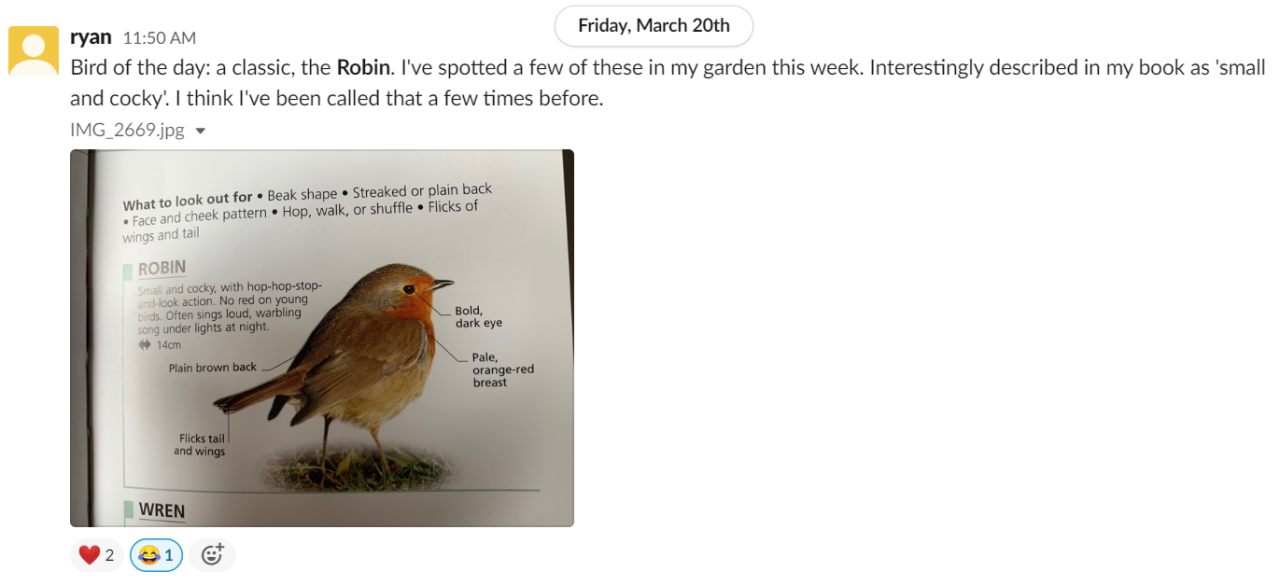
Audience insights. As an insight led, innovation agency it’s one of the three lenses we use to approach any project, with any client, at any stage. With this new, unique and pretty weird environment we all find ourselves in, what does this mean for this key ingredient to our work?
Should we simply ignore Coronavirus when gathering insight? Can we expect our audience to revert to BC (Before Corona) and ‘temporarily forget’ about the virus? Will the insight we gather be relevant in the world AC (After Corona)?
With a third of the global population on Coronavirus lockdown, we’re interested in the impact that staying at home, Corona-concerns and the rapid adoption of new social norms will have on our insight collection. Consequently, how will this impact our work?
Katie 2:45 PM
Hey Ryan, we’ve quite quickly moved all our approaches online, which has been great but shall we chat about the challenges of collecting authentic, useful and durable audience insight at a time like this?
Ryan 2:46 PM
Yes, it's been a hot topic for us at the moment. We’ve spoken to many of our clients about changing approaches, rapid campaigns and finding the right balance with communication tone and advice.
On one hand you could say there's more people around at the moment to do research with, but that said, people's lives have changed so much in recent weeks that what they're thinking and feeling will be so influenced by the current situation.
Katie 2:51 PM
Yeah true, more people at home and potentially looking for things to keep them busy or give them a voice about something they care about. I saw this recently, unsurprisingly ‘95% of consumers say they’re now spending more time on in-home media consumption activities’. Here’s the breakdown and report:
https://blog.globalwebindex.com/trends/coronavirus-international-study/

Ryan 2:46 PM
What type of audience research have you got planned in for your projects, what sorts of things are you researching, with who and how?
Katie 2:51 PM
Well, we were planning to do a smokescreen test on facebook for one of my projects. Problem was twofold, firstly - it was to test a mass participation event, which obviously would confuse people and not be well received at all. Secondly - the audience were people deemed to be high risk to Coronavirus, which makes advertising events to them very insensitive.
Ryan 2:52 PM
Were you planning on doing those facebook ads to gauge whether people would be interested in the idea?
Katie 2:52 PM
Yeah to understand event appeal. It just wouldn’t have been a sound experiment and more significantly, would have risked the charities’ brand reputation by sending out insensitive communications to their supporters.
Ryan 2:53 PM
Yup, sounds like you did the right thing cancelling it! So what did you decide to do?
Katie 2:54 PM
We decided to switch it up, and email the charities’ supporters with a questionnaire about the event instead.
We of course acknowledged coronavirus in the email asking them to complete it, but did not mention it in the actual survey.
Ryan 2:54 PM
You confident this new approach will get you what you need?
Katie 2:57 PM
Yes, I feel confident that we'll get normal results now but for other types of research this wouldn't work so well. What are we going to do about other types? For example I'd worry about connecting with audiences earlier on in the innovation process.. Should we postpone or adapt our approach, what do you think?
Ryan 3:02 PM
I think it depends on what you're using the research for. To do qual research at the moment ignoring the context of the world right now doesn't make sense. But, I'd argue in some cases there's more of a need than ever to better understand how people's lives are being affected at the moment, and what that means for the products and services you offer them.
Have any of the charities you're working with been speaking about this?
Katie 3:05 PM
Yeah, their views have been varied. Some, understandably, are shrinking down and focusing on emergency appeals with close relation to Coronavirus. But others see an even stronger need for innovation and reconnecting with their audiences to better understand their new needs. What’ve you heard?
Ryan 3:06 PM
Much the same. For those who are going out with campaigns and ads in the current climate there’s an obvious worry about going out with the right message and tone. We’ve been helping them connect with their audiences to work out how to get this right before launching anything new.
Katie 3:07 PM
Yeah I’ve read some polarizing views, saw a report which said ‘When asked if brands should carry on advertising as normal, just over a third agree, just over a quarter disagree and just over a third aren’t sure.’
So it definitely makes sense to test your messaging with a research group before it goes out.
But how do you think we should adapt our approach for other types of research like exploring new audience needs?
Ryan 3:09 PM
There are some obvious things like needing to figure out the practicalities of doing everything remotely. But for us that's less of a problem because we tend to use online communities to do our qual research. But I've been speaking with a few of our charity clients recently who are worrying about how they can keep in touch with and stay close to their beneficiaries as they face unique and new challenges in almost every aspect of their lives.
I think this is really important. Things are changing every day for all of us at the moment and for any organisation providing a service or product to someone, especially someone in a fragile or vulnerable situation, it feels more important than ever to really understand what challenges they're facing at the moment
Katie 3:09 PM
I agree and I think the changes we're seeing will have a lasting impact so the quicker charities can understand them, the better.
Ryan 3:10 PM
And I'm hearing lots about how commercial companies are on the front foot and using online communities a lot to stay connected with their customers.
Katie 3:19 PM
Sounds like a good move. Connecting people in a virtual environment with one another could help them feel better supported as well as providing connection with the charity and insight into their lives
Ryan 3:21 PM
What kind of lasting impact do you reckon we'll see once this is all over?
Katie 3:22 PM
Well our lives have fundamentally changed. They say it takes 21 days to build a habit, in this unique situation I'm intrigued to see what new habits and ways of thinking people develop
So although after corona (AC) we will all revert to 'normal', surely some of those changes will stick and there will be a ‘new normal’? What do you think?
Ryan 3:27 PM
That's interesting, most of the conversations we’ve been having with clients are about identifying people's immediate needs and problems to design solutions in the short term, but you're right, there's definitely an opportunity to use it to identify new trends, mindsets and behaviours that will persist once this is all over
I'd like to think lots of these changes will stick. I listened to a podcast recently talking about how this is going to change individuals and companies attitudes to doing good. And we’ve seen unprecedented collaboration between the public, social and private sectors but will that continue when this is all over? It would be super interesting to understand that more and imagine what will change in the long term.
Katie 3:29 PM
I guess there will be connection between the two, some of those immediate needs may well convert into long standing requirements. Saying that, we never quite know what's round the corner. Maybe something else will happen which will change mindsets again...
Do you think in general at this time it will be easier to reach and understand new audiences? Could Coronavirus make us more open to honest conversations? or closed off, as we may be physically..
Ryan 3:32PM
In terms of reaching them, none of the research we've been doing over the last 2 weeks has been affected because people aren't available to participate, in fact it's been the opposite.
Whether people will be more open to honest conversations, I think this type of situation does tend to make us all more reflective. It feels like I've been thinking more than normal about family, life in general, the future. Not sure if that's just me though?
Katie 3:35 PM
Yes, me too. I've been re-evaluating how I want to spend my time, who I want to speak to and what feels important to achieve in the rest of the year. Plus, we've got new hobbies - Spanish and birdwatching!

Ryan 3:37 PM
Birdwatching for four days straight this weekend! Did you chat to Rob about how he’s approached stakeholder research for his project?
Katie 3:38 PM
Yeah, he’s been interviewing experts and said, other than some upfront small talk about the virus it hasn’t impacted the rest of the conversation. Similarly, for audience interviews, he’s been unearthing their core values and beliefs about a topic which haven’t been impacted in the short term by the pandemic.
I guess we’ll need to consider how we manage the virus within our conversations, and as we usually do, continue to engage audiences throughout the innovation process to keep our fingers on the pulse.
I’m really interested to see how the emerging consumer trends could also provide great opportunities for charities. If they can tap into those now that would be very exciting
Any final words of wisdom?
Ryan 3:37 PM
As you say, I think there’s a real need for charities to engage with their beneficiaries and supporters during this time. One of our clients said something recently that really stuck with me. Half of the challenge is staying close to these people in this rapidly changing world. But for big organisations it’s just as difficult to evolve your products and services equally quickly.
Back to the research point specifically, if we’re careful with how we position it, and what we’re using it for, then there’s no restrictions on what we can and can't do.